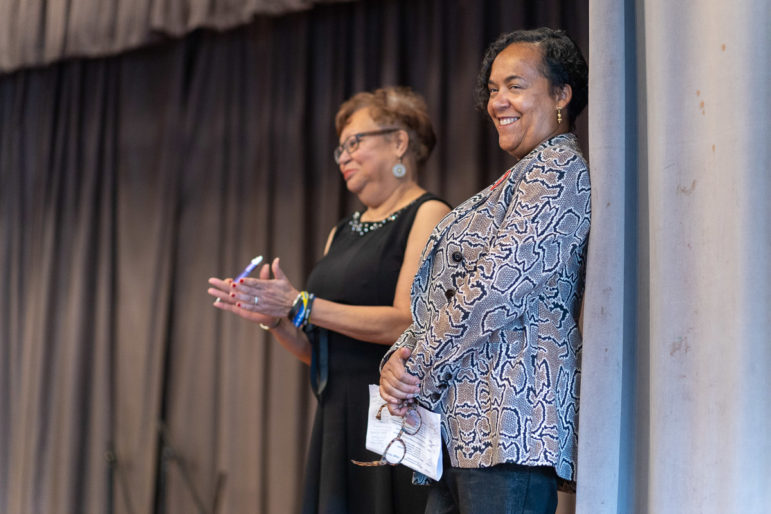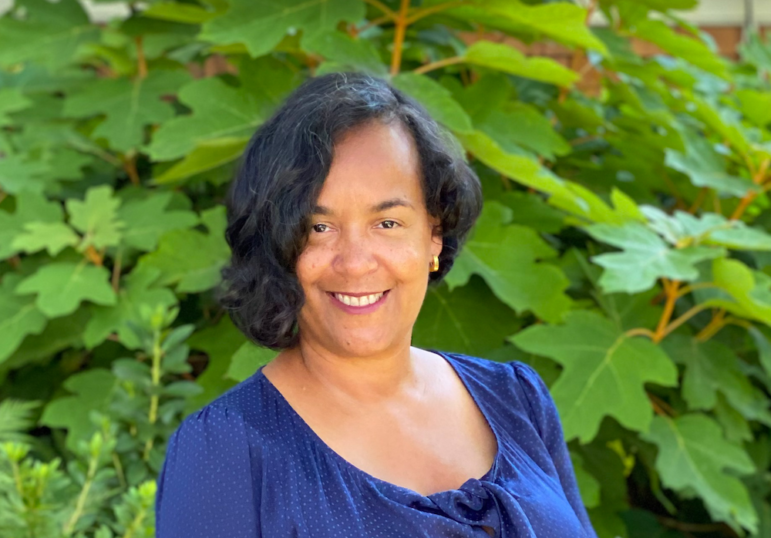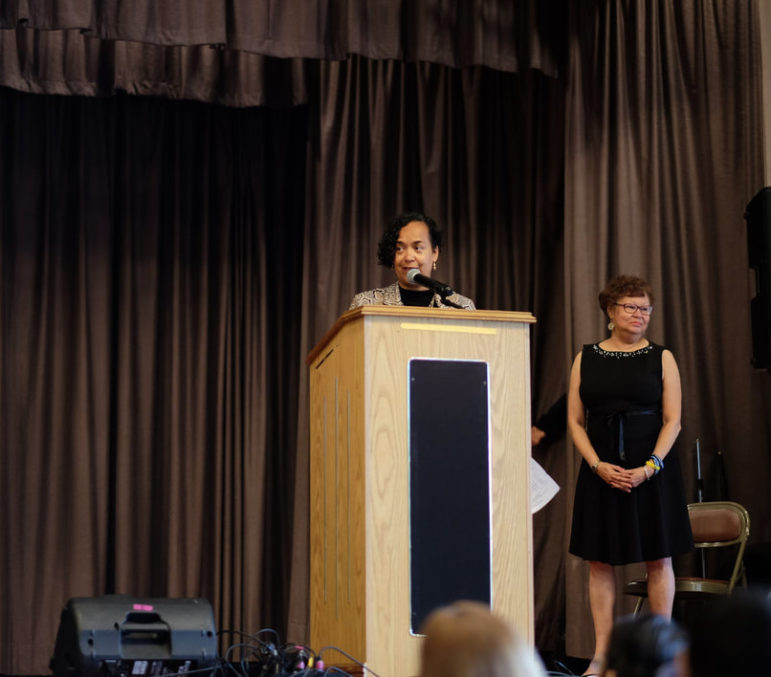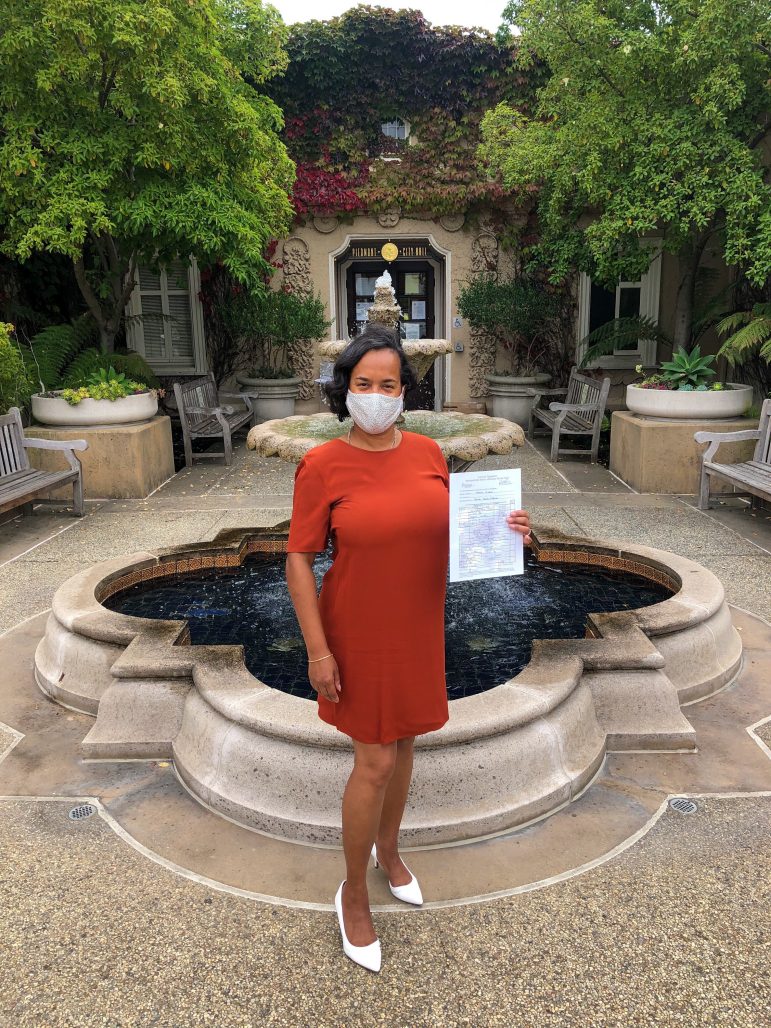
MLK celebration event co-organizer Veronica Thigpen (right) with Lois Corrin at Veterans’ Hall on Jan. 20, 2020 


Anderson Thigpen is one of five candidates vying for three seats on the School Board. This is her first time running for public office.
What is your age and how long have you lived in Piedmont?
I’ve lived in Piedmont since 2018. I moved here with my husband and daughter, and we decided to live in Piedmont in large part because of the schools.
What do you do for work, either in or out of your home?
I am a consultant who advises education nonprofits and school systems that are looking to build equitable, inclusive and effective organizations.
If you have children, do they attend, or have they attended, Piedmont schools? If so, which ones?
I have a daughter who is a junior at Piedmont High School.
Have you worked or volunteered in Piedmont schools (or elsewhere) previously? If so, in what capacity(ies)?
As a parent volunteer at PHS, I have volunteered to drive carpool for my daughter’s badminton team and usher for the PHS musical. I worked with PHS students and educators to launch a Black student affinity group and partnered with community advocates to submit a racial equity policy.
I am currently co-president of the Piedmont Appreciating Diversity Committee and in 2019 and 2020, I co-chaired Piedmont’s MLK Day Celebration.
Before moving to Piedmont, I was an active volunteer at my daughter’s elementary school in Chicago, serving as a room parent, a parent communications coordinator, and co-chair of the Parent Association’s Diversity, Equity and Inclusion Committee. I’ve also served as a board member for several nonprofits, including Community Organizing and Family Issues, where I was board president.
I also taught math for a community GED program.
What inspires you to run for office?
I’m passionate about equity and inclusion in public education—qualities that Piedmont schools can use now.
As a relatively new resident of Piedmont, I offer a different perspective and fresh approaches informed by research and exposure to other school districts. I bring my lived experience as person of color.
I bring my background as an education journalist and as a consultant who advises schools on strategy. I have closely followed education policies, trends and practices for more than 20 years. I am a problem solver who draws on my professional experience in education and my social justice values to develop solutions that work.
I believe in public service and I have long served on the boards of nonprofit organizations and volunteered in the communities where I live.
What are your qualifications to be on the School Board? Any special skills or experience the voters should know about?
Currently, I advise school systems and educational nonprofits on strategy.
Previously, I was an award-winning education policy and business journalist, looking deeply into how issues affect schools—including policy development, instructional practice and funding. I was also a member of the steering committee for the University of Chicago Consortium on School Research, a group that reviews academic research for school improvement.
As a working parent of a PHS 11th grader, I am committed to the highest educational standards and to sustaining excellence, even in these tumultuous times, and grounding all we do in equity and inclusion. I have a bachelor’s in economics and a master’s in journalism from Northwestern University.
What do you see as the most challenging issues currently facing the school district?
Obviously, the most challenging issues schools face now are uncertainties resulting from the pandemic and distance learning. The loss of personal contact between students, their classmates and their teachers has been devastating. Everyone is feeling the pressure.
In recent weeks, students have transitioned from unstructured summer months at home to the rigors of daily classes and homework. Working parents struggle to balance office responsibilities with parenting, a particularly challenging dance for those with young children. At the same time, teachers are working mightily to adjust to new technologies in remote environments.
COVID has presented us with a steep challenge: How do we educate our children in a different way that is both effective and fulfilling?
What do you see as strengths of the Piedmont schools?
Piedmont schools have a longstanding track record of academic excellence and high performance across all grade levels. Students graduate high school ready for college and careers. Elementary schools have cultivated solid community bonds. Opportunities for extra-curricular programs and sports are abundant.
What will be your top priority if elected?
My top priority is maintaining educational excellence during these challenging times. The pandemic has thrown us for a loop and all of us – parents, educators, students – are having a tough time. Our focus must remain fixed on ensuring that students continue to learn and grow.
Do you see yourself being especially involved in any particular school issue or program, whether or not it’s your top priority?
I believe equity must be a core value. There is so much more we can do in Piedmont to elevate equity to ensure that our students are prepared for the complex and increasingly diverse world that awaits them.
We also need to create more spaces and structures for students to feel welcomed, heard, understood and empowered. Our students are already leading the way to create spaces where they can connect and make sense of what’s happening around them. We must support them and provide opportunities for them to find their voices when they are young.
How and when PUSD should return to in-person instruction has been a polarizing topic since the start of the pandemic. If elected, how will you balance the needs of various stakeholders — teachers, parents, classified staff, administrators, students — in your decision-making on this issue?
Balancing the needs of school stakeholders means keeping my focus on our common goals: Getting students back to school as soon as safely possible and continuity of educational excellence. Agreement on these fundamental goals will drive discussions and decision-making related to distance learning and the process and timing for a return to in-person instruction.
PUSD’s budget depends on state and local funding. What would you do to ensure our funding is robust?
I will work with school stakeholders to assess PUSD’s current budget situation and work in partnership with them to tap resources to maintain educational excellence across every school.
What do you think about PUSD facilities and bond measure H1?
Bond measure H1 provides the resources for building two structures for the high school: A STEAM building, which is well underway and near completion; and a performing arts building and theater that is scheduled to open in 2021.
Research has shown that school facilities have a powerful impact. State-of-the-art facilities can positively affect a district’s ability to recruit and retain teachers—a much-needed benefit amid the current teacher shortage. Improved facilities also make a difference in student health and performance. These positive outcomes make it worth the investment.
Between the city and the schools there are many shared facilities and programs. What is your perspective on city-school partnerships and collaboration?
A collaborative relationship between PUSD and the city of Piedmont is necessary to leverage resources needed by both. For example, the city recently gave notice of two ballot measures that will raise much needed funds to repair and rebuild city facilities including parks, recreation facilities and a new pool. All of these facilities are used regularly by PUSD schools.
Recent events have highlighted the educational inequity between Piedmont and nearby school systems such as Oakland Unified. What measures, if any, do you think PUSD should take to address this problem?
Piedmont schools have an opportunity to forge new relationships with larger districts like Oakland and Berkeley. These districts can benefit from working together in specific ways to offer students opportunities that they would not otherwise have. I am excited to explore what some of those opportunities might be.
School Board members must navigate a wide range of parent opinions and demands. How will you handle those pressures?
Parents all share a common goal for their children: We want schools to prepare them with the skills and knowledge and habits for adult life. Students will not share a common path to get there, and to the extent possible, educators provide instructional approaches and pathways for students of different abilities to learn and grow.
Parents often reach out to the School Board seeking information they have not been able to get elsewhere or to remedy a situation that requires special attention. Radical collaboration is the approach I would use to work in partnership with parents, listening to their concerns and asking about their children’s needs, and then seeking solutions that address both.
Is there anything else you’d like to share with voters about your candidacy?
While I am relatively new to Piedmont, I have also spent time in other parts of the Bay Area. Ten years ago, I spent a year at Stanford University as a John S. Knight Fellow.